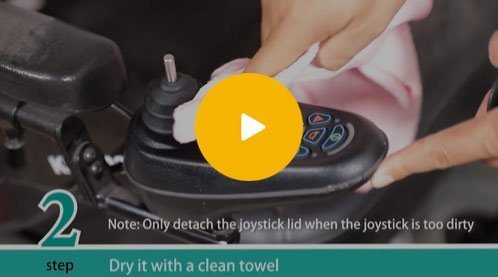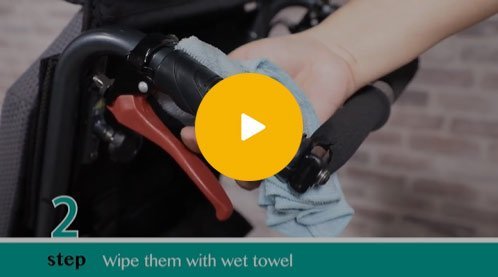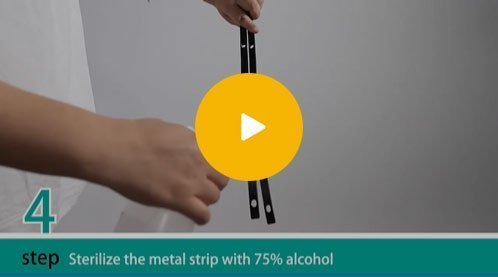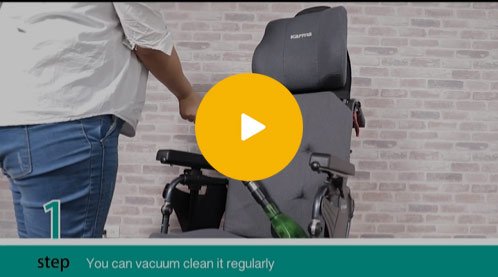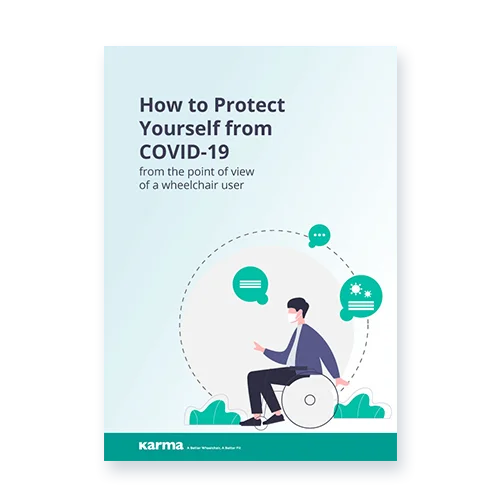How to Protect Yourself from COVID-19
Tip 1
Carry alcohol hand sanitizer, to clean your hands and the important parts of the wheelchair
75% diluted alcohol is the most effective protection for wheelchair users! You can divide the hand sanitizer into small bottles and carry it with you. When it is not convenient to wash your hands, you can use the hand sanitizer to disinfect the parts of the wheelchair that you touch most often e.g. the armrests, joystick control, push rims. Many people also use sanitizing wet tissues, as long as they can disinfect, they can be used when you’re going out.
Tip 2
Wear gloves
There are many wheelchair users who like to wear gloves when using their wheelchairs, which is also a great way of preventing the spread of infection. During epidemic prevention, it is recommended to wash the gloves with soapy water every day to prevent the virus lingering on the fabric. If you want to enter or leave a higher-risk place, such as a hospital, we recommend that you use disposable gloves (such as Latex gloves or pvc gloves).
Tip 3
Maintain social distance and avoid crowds and wear gloves
The Centre for Disease Control and Prevention recommends that everyone should maintain a social distance of 1.5 meters or more indoors and 1 meter or more outdoors. However, when there are large crowds wheelchair users are easily surrounded by a crowd due to their height. During epidemic prevention avoid places with too many people.
Tip 4
Maintain a healthy diet and regular work and rest schedule
During this epidemic prevention period, it is important to maintain a normal work and rest schedule. Eating healthily, maintaining a proper exercise routine, and keeping warm will help you maintain a healthy body and good physical strength to fight against a virus. Also try to avoid eating out and eating with others to further prevent the spread of any infections.
Tip 5
Make sure caregivers are keeping on top of their personal hygiene
Some wheelchair users need the assistance of caregivers. The personal hygiene and cleanliness of the caregivers themselves must be done according to the standards of the Centre of Disease Control. Before assisting wheelchair users, caregivers should protect themselves in order to protect others.
Tip 6
Clean your wheelchair regularly
When a wheelchair has been used on a long journey or in places that are not properly cleaned, dirt and germs can hide in the seat and back cushions. Although these are not as threatening as the new Coronavirus, long-term exposure can weaken the immunity of wheelchair users.
Whether you clean the wheelchair yourself or send it back to the original factory to be professionally disinfected, ensure to clean any surface that you touch.
Tip 1
Always wear a mask when talking
When wheelchair users are about one-third shorter than that of someone standing. When wheelchair users talk to someone standing they have to raise their heads almost 45 degrees. During these conversations droplets or spit travel through the air. We now know that the new Coronavirus can spread through these droplets so it is important to wear a mask during the epidemic prevention and sit when talking to wheelchair users so you can have level eye contact as well as respect social distancing.
Tip 2
Avoid leaving bacteria on wheelchairs
During epidemic prevention, it is recommended that non-disabled people should avoid touching the wheelchair when talking with the user, especially the push handles and armrests. Sometimes we will be talking and naturally move to put our hands on the armrests. Try to avoid doing this to ensure the safety of both parties.
Tip 3
Caregivers to take extra precautions
We believe that each caregiver has a considerable amount of care experience, but during the epidemic prevention period, we need to take extra precautions when cleaning and performing caregiver duties. You should wear gloves during care, protecting yourself is also protecting others. The health of a wheelchair user is dependent on your paying special attention to care.
What should I do if I have to use a public toilet as a wheelchair user?
Clean the toilet seat
All wheelchair users must use a seated toilet, wipe the toilet seat with alcohol sanitiser before use. Close the toilet lid when flushing to prevent aerosolized feces flying into the air and landing on your skin. There are also many wheelchair users who use a urine bag (urostomy bag) to drain urine into the toilet for convenience when going out. It is recommended to keep the urine bag changed and clean during the use of the urine bag.
When washing your hands
After you’ve used the toilet, wet, scrub, rinse, and dry. Do not only pay attention to the actions, but also to the time that you are washing your hands. The most important thing to remember is to wash your hands with soap for at least 20 seconds. Sometimes people think that 20 seconds is a waste of time, but in fact it is a small price to pay to prevent the spread of bacterial infections.
What should I do if I have to go to the hospital or rehabilitation center?
Tie your hair up and wear a hat
When your hair is down, your hands will unconsciously want to tidy up the hair. During this process, the bacteria on the hands will stay on the hair. We can wash and disinfect our hands often but we typically wash our hair just once every two days. Our hair is close to our face, nose and mouth and so will be more susceptible to the invasion of bacteria. You can also wear a hat to keep warm as well as reduce the residual bacteria in the hair. Make sure to select a hat that has a smooth and shiny surface, and not one with many gaps such as a woven wool hat.
Always clean your hands
Wheelchair users must take the elevator when travelling between floors. Avoid sharing the elevator with multiple people, when you press elevator buttons, remember to wash or disinfect your hands and do not touch your mouth or nose.
Clean and disinfect your wheelchair
Before entering your home after treatment, disinfect the areas of the wheelchair that you touched. The key places being: the armrests, push rims, joystick controller, etc … Wheelchair users have also shared that they use a large piece of cloth dipped in disinfectant or diluted bleach and put it on the ground. They move the wheels back and forth to clean the wheels to avoid bringing bacteria into the house.

 Global
Global